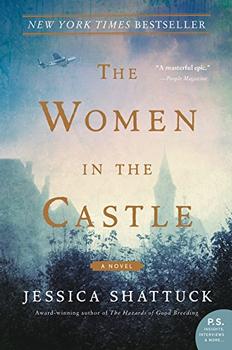Book Club Discussion Questions
In a book club? Subscribe to our Book Club Newsletter!
For supplemental discussion material see our Beyond the Book article, Operation Valkyrie and our BookBrowse Review of The Women in the Castle.
Please be aware that this discussion guide will contain spoilers!
- Did anything surprise you about conditions in post-war Germany? Did you learn anything new from the novel?
- How did each woman's past influence how they reacted to the rise of Nazi Germany? Did Marianne's privilege make it easier for her to be an active resister? Why was Benita dazzled by the Nazi's pageantry? How did Ania's childhood influence her feelings toward Hitler?
- Did you identify more with one women than the others? Which did you have the most sympathy for? Which the least?
- Marianne insisted the children look at gruesome billboards showing conditions in the death camps and bearing the caption, These shameful acts: Your guilt.What do you think of her determination that the children be aware of the worst of their country's actions? Do you think she was right or wrong not to shelter the children?
- Do you think the three women would have been friends if not for the war? While the war brought these women into each other's lives, do you think it's ultimately what bound them together, or were there other factors?
- How do you think the events of the war and its aftermath shaped each of the women and their perceptions of themselves?
- If Ania had been more honest about her past and Benita been more open about her love for Herr Muller, how do you think Marianne would have reacted?
- Before the war began, Marianne was charged with being "the Commander of Wives and Children." Do you think she upheld her duty? A passionate and deeply moral woman, Marianne was certain she always did the right thing. Do you think she did? Was she a good protector and friend to Benita and Ania?
- What drew Benita to Connie? Do you think she loved him? What were her true feelings for Herr Muller? Should Herr Muller have defied Marianne and married Benita?
- How did Benita's beauty both help and hurt her? How did reading Connie's final letter influence the tragic choice she makes? Why do you think Benita felt that love, for her generation, was dead?
- Do you think Ania was like most ordinary Germans of the period? Do you think she was right, later in life, to be ashamed for her actions during the war? How do you think you would have reacted in her place?
- Do you think it's possible to put our past behind us and create a new beginning for ourselves? Are there dangers in remembering the past, or in clinging to it? Are there dangers in forgetting the past?
- According to Martin, "Americans can face the world with open arms, Marianne had once said, because the world hasn't yet come to knock it down." Do you think this is true? Do you think it's ever been true in America's history?
- Ania thinks to herself that people have children "even when they believe the world is going to hell, even when life is nothing but uncertainty" in hopes of someday being understood. Do you agree?
- At the end of the war, each woman was in a different place, physically and emotionally. What do you think of the choices they were forced to make to survive?
- How do you think the novel challenges our perceptions and notions of Germans during and after the war?
- Do you think women like Marianne, Benita, and Ania were victims, or do you feel they bear responsibility for Hitler's rise to power and consequently their own plights, post-war? How accountable are individuals for their leaders? What about resisters like Marianne and her circle? Why do you think she saw the true monster that Hitler was when many others did not?
- Do you find The Women in the Castle holds insight for our own time?
Copyright BookBrowse 2018
Unless otherwise stated, this discussion guide is reprinted with the permission of William Morrow.
Any page references refer to a USA edition of the book, usually the trade paperback version, and may vary in other editions.
